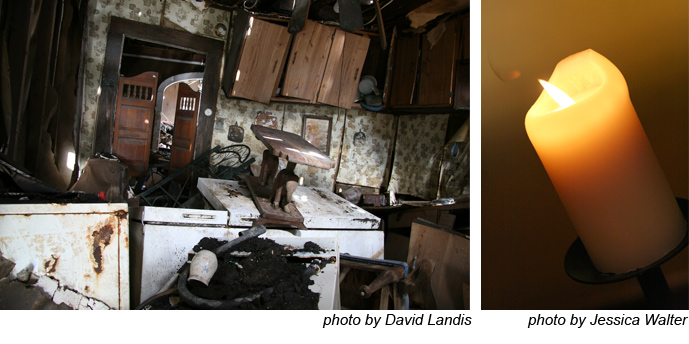Blaine Detwiler, Lakeview
detwiler@nep.net
I have no qualms with our Mennonite Church USA logo, a dove with an olive branch carried in its beak, except that a logo has its limits.
I have no doubt that God’s Holy Spirit very often “touches down” on people like it did on Jesus, as a dove gently, peacefully and with goodwill from the Father in heaven above. Except, to argue that a dove has its limits.
It made immediate sense to me the day I first heard there was another early Christian group who chose a different bird for their spiritual logo. Living in their harsh northern climates these Christians decided a wild goose should stand in for what is good, what is strident and unnerving about God’s Spirit.
I must say that I have always loved wind. There are days when I fantasize giving up my day jobs to become a tornado chaser. On a darkening summer day as a thunderstorm pushes in from the west I am apt to run outside in our back yard and face it, to feel its bluster. In December several nor’easter storms brushed our area with their ferocity. One Sunday as trees blew down we canceled our worship service and, during the height of what a sailor might call “a blow,” I pulled on my boots and ventured outside. Ice pellets were whipping their sideways path to the ground and stung my face red when I chanced to face them.
I always welcome a good reading of Psalm 29. When I hear “The voice of the Lord flashes forth flames of fire…The voice of the Lord shakes the wilderness…The voice of the Lord causes the oaks to whirl, and strips the forest bare…” I begin wondering where a dove goes and finds refuge in the middle of all this fierce “glory.”
Studies show that Mennonites, myself included, have a strong preference for using the Gospels in preaching. And rightly so. The Gospels of Matthew, Mark, Luke and John are full of colorful Jesus dramas. But where the Gospels leave off there quickly comes this strange and wonderful experience of the Holy Spirit. The book of Acts says this fresh arrival comes with its own distinct sound, the sound of wind. Not just any wind but a violent wind. And again, I wonder how the dove is doing, where it goes and why this wind sound needs to be so “gusty,” so violent!
Our daughter Becky and her family of three live in a rented house on an Old Order Mennonite farm in Dayton, VA. Their landlords are a hospitable older farm couple, Margaret and James. Margaret manages the kitchen. On a slow afternoon James will take up his digging spade and with a blue handkerchief in his rear pocket go walking their farm fields in search of thistles. Those purple flower weeds which appear as a smudge on the landscape of any farm worth its salt need to be dug out. James is not alone in his thistle work or in his soul work.
Julia Kasdorf, with a poet’s candor, captures some of the conflict historically present in our collective soul as her poem called Mennonites begins;
We keep our quilts in closets and do not dance.
We hoe thistles along fence rows for fear
we may not be perfect as our Heavenly Father.
We clean up after disasters. No one has to
call; we just show up in the wake of tornadoes
with hammers, after floods with buckets.
Like Jesus, the servant, we wash each other’s feet
twice a year and eat the Lord’s Supper,
afraid of sins hidden so deep in our organs
they could damn us unawares,
swallowing this bread, his body, this juice.
I have no regrets when God’s spirit comes quietly. When without words a tear begins sliding down the cheek with a forgiveness of inner healing so gentle that even a dove might be jealous. It is hard to object when falling snowflakes surprise a place like Baghdad and we marvel as their silent drift puts a delight on the face of a despondent city. Healing and hope carry a quiet mystery all their own.
But there are times when God’s spirit gets unruly. There are times when the Spirit of God gains a momentum with such force that old habits like trees are uprooted. Times when a powerful addiction like money can turn and go storming towards generosity. Times when it takes a more forceful move of the spirit to unseat the damning sins we carry deep inside us. When attitudes of fist-clenched hatred begin to loose their grip. Times when churches are not so much formally planned, organized and nurtured but instead jump up on street corners where we least expect them. In the book of Acts the high wind of the spirit makes 120 people appear as if they were drunk. And I find myself wondering where the dove was perched that day.
Let us make whatever claims we need for a logo to hold. But let’s also remember that when the wind of God’s Holy Spirit blows through our lives a new community is formed and, like the aftermath of a good nor’easter, nothing will be the same.

Left: The aftermath of Hurricane Katrina in New Orleans, La.
Right: A candle representing the Holy Spirit in a worship service.
The opinions expressed in articles posted on Mosaic’s website are those of the author and may not reflect the official policy of Mosaic Conference. Mosaic is a large conference, crossing ethnicities, geographies, generations, theologies, and politics. Each person can only speak for themselves; no one can represent “the conference.” May God give us the grace to hear what the Spirit is speaking to us through people with whom we disagree and the humility and courage to love one another even when those disagreements can’t be bridged.
